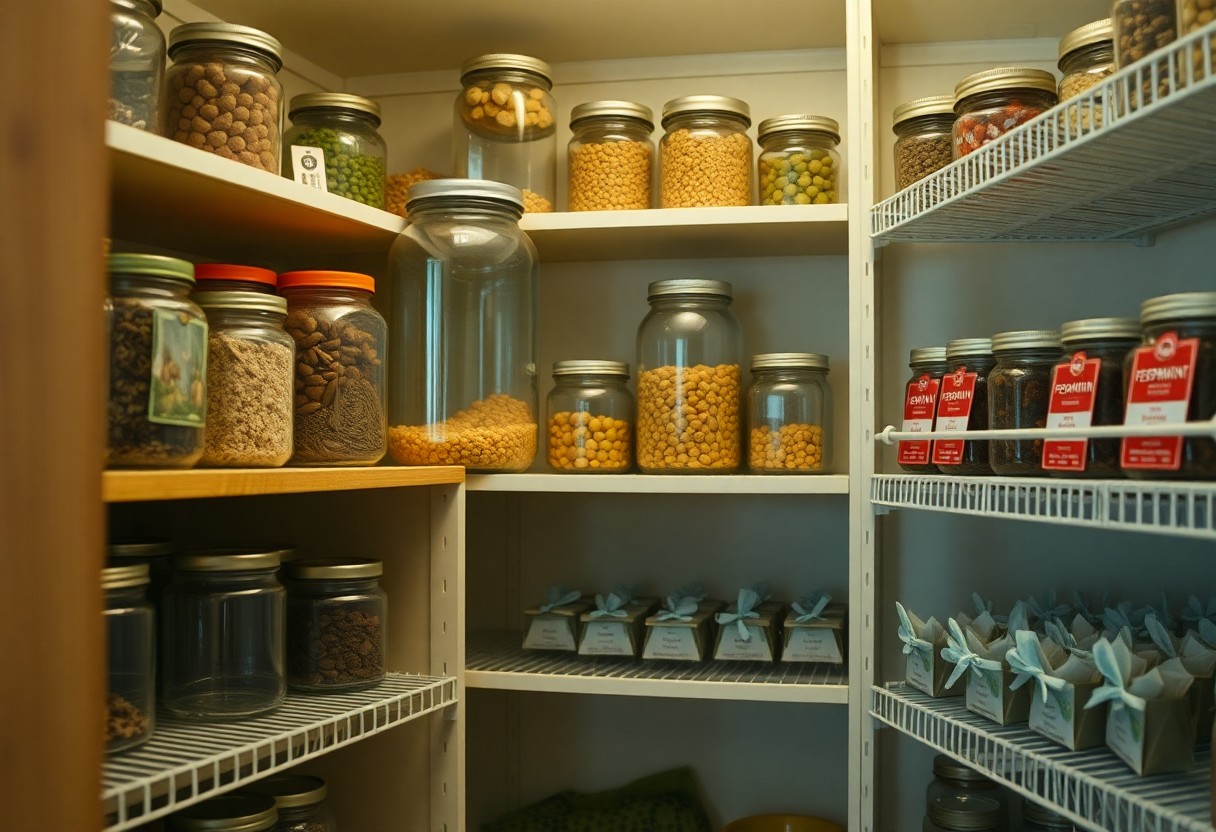Most homeowners struggle with the challenge of keeping their food safe from pesky mice in the pantry. Mice can not only contaminate your food but also lead to serious health risks and damage to your home. In this post, you’ll discover effective strategies to protect your food, including storage solutions and preventive measures to ensure that your pantry remains mouse-free. By implementing these tips, you can safeguard your food and maintain a clean and healthy kitchen environment.
Key Takeaways:
- Store all food items in airtight containers to prevent mice from easily accessing them.
- Keep the pantry clean and free from crumbs or spills that could attract mice.
- Seal any holes or gaps in pantry walls and cabinets to eliminate potential entry points for pests.
The Anatomy of a Rodent Infestation
Understanding how a rodent infestation develops is key to effective prevention and control. An infestation often starts with just a few mice, which can reproduce rapidly, with females having up to 10 litters a year. Their capacity to reproduce means that if left unchecked, a few mice can quickly turn into a larger colony, multiplying the potential for damage and contamination in your pantry.
Identifying Signs of Mice in Your Pantry
Look for small droppings near food containers, as well as gnaw marks on packaging, which indicate mouse activity. You might also notice nests made of shredded paper or fabric tucked away in corners, along with a musty odor that can result from urine. Hearing scurrying sounds at night is another telltale sign of their presence.
Understanding Mice Behavior and Dangers
Mice are nocturnal creatures, seeking shelter, food, and warmth in your home, especially in hidden areas like pantries. Their ability to squeeze through tiny openings allows them to invade even the most secure spaces. This behavior, combined with their ever-growing populations, increases the risk of contamination with harmful bacteria and diseases, such as hantavirus and salmonella, which pose serious health concerns for you and your family.
Understanding the mechanics of mice behavior enhances your ability to prevent infestations. Mice are adaptable and can learn quickly, which makes traditional traps less effective if not placed strategically. They are also known to be attracted to the scents of food, making your pantry a prime target. Given their propensity to chew through packaging, it’s necessary to store food in airtight containers to mitigate risks effectively. Moreover, since they are social creatures, they often travel in groups, meaning if you see one mouse, it is likely there are others nearby, emphasizing the need for prompt action in addressing an infestation.
Proven Barriers: Physical and Structural Solutions
Implementing physical barriers can significantly reduce the likelihood of a mouse invasion in your pantry. Start by identifying weak points in your home, such as gaps in walls, doors, and windows. Use metal mesh screens and caulking to seal these vulnerabilities. Ensure the installation of door sweeps and weather stripping on exterior doors to eliminate potential entry points. Focusing your efforts on structural integrity will build a solid foundation to prevent any future rodent problems.
Sealing Entry Points: Where Mice Get In
Mice can squeeze through surprisingly small openings, as small as a dime. Inspect your home for common entry points, including cracks in foundations, gaps around pipes, and holes around utility entries. Pay special attention to areas where walls meet floors and ceilings, as well as vents and exhaust fans. Sealing these entry points with materials such as steel wool, caulk, or expanding foam will help keep these unwanted guests out of your pantry.
The Importance of Containerization for Food Storage
Storing food in containers is an effective strategy to deter mice from accessing your supplies. Airtight containers made from glass or heavy-duty plastic create a barrier that cannot be penetrated easily by rodents. Not only do these containers safeguard your food from pests, but they also help to preserve freshness. You can choose various sizes and shapes based on your pantry layout, ensuring everything from grains to snacks is protected. This proactive approach diminishes the risk of contamination and repels mice, ensuring your pantry remains a safe haven for your food.

Strategic Sanitation: A Clean Pantry is a Safe Pantry
Keeping your pantry spotless is a proactive step in safeguarding your food from mice. Regular sanitation not only deters pests but also allows you to spot any potential problems before they escalate. A tidy environment reduces the chances of mice finding hiding spots or easy access to your food supplies.
Best Practices for Maintaining Cleanliness
Start by routinely cleaning shelves and organizing your pantry items. Use airtight containers to store grains, cereals, and snacks, and regularly dispose of expired products. Pay attention to spills, crumbs, and food particles, which can attract mice. Establishing a weekly cleaning routine helps maintain a hygienic space and keeps your food protected.
Regular Inspections to Prevent Infestations
Frequent inspections of your pantry are crucial for catching signs of a mouse presence early. Look for droppings, gnaw marks, or nesting materials, as they indicate an infestation is nearby. Aim to inspect your pantry at least once a month, checking behind and beneath shelves where debris tends to accumulate. Observing any unexpected changes or disturbances can help you take swift action, reducing the chance of a full-blown infestation.
During these inspections, take note of any food packages that show signs of damage or wear. If you spot even a few droppings, consider it a warning, as mice reproduce quickly. Address these issues immediately by cleaning thoroughly and sealing any cracks or gaps that may allow mice to enter your pantry. This proactive approach ensures that any mouse activity is caught early, limiting their ability to establish a foothold in your food storage area.
Natural Repellents and Traps: Safeguarding with Your Own Arsenal
Utilizing natural repellents and effective traps provides a comprehensive approach to keeping your pantry rodent-free. You can employ various household items to deter mice, while strategically placing traps can help manage their presence. These methods not only protect your food but also promote a healthier environment in your pantry.
Effective Use of Natural Deterrents
Employ scents such as peppermint oil, which mice find overwhelming and will avoid. Soak cotton balls in peppermint oil and place them in corners or near entry points in your pantry. Other natural deterrents include vinegar and cayenne pepper, both of which can also inhibit rodent activity by disrupting their sense of smell.
Selecting the Right Traps for Your Space
Choosing suitable traps is crucial for ensuring an effective strategy against mice. Options include snap traps, glue traps, and electronic traps, each serving different needs based on your pantry’s layout and your comfort level with handling traps. Assess your space; if you have children or pets, opt for less hazardous methods, like humane traps or glue traps placed out of reach.
Your pantry’s dimensions and the severity of the infestation will dictate the type and number of traps to set. For smaller spaces, use compact snap traps that fit easily between shelves. If you’re dealing with a larger infestation, consider multiple traps placed strategically along mouse pathways, ideally near food sources or droppings. Frequent monitoring will ensure that you can respond promptly to any new activity.

When All Else Fails: Partnering with Pest Control Experts
If you’ve tried various DIY methods to keep mice at bay with little success, it may be time to seek professional help. Pest control experts can efficiently assess the situation, provide targeted treatments, and offer tailored prevention strategies. Their expertise not only saves you time but can also prevent further, more significant damage to your home.
Knowing When to Call Professionals
Choosing the Right Pest Control Service
Finding the right pest control service involves some research. Look for companies that prioritize integrated pest management, have positive customer reviews, and are licensed and insured. Ask for quotes and compare services; many companies even offer free inspections that can help you determine the best approach for your specific needs.
Final Words
From above, you can see that protecting your food from mice in your pantry requires a combination of sanitation, physical barriers, and monitoring. Keep your pantry clean and organized, store food in airtight containers, and seal up any entry points to discourage these pests. Regularly check for signs of activity and maintain a proactive approach by using traps or natural deterrents. By following these strategies, you can ensure that your food remains safe and untainted from unwanted visitors like mice.
FAQ
Q: How can I prevent mice from entering my pantry?
A: To prevent mice from entering your pantry, start by sealing all entry points. Inspect for gaps around doors, windows, and vents, and use caulk or steel wool to fill in any holes. Ensure that weatherstripping on doors is intact and consider installing door sweeps to block any gaps at the bottom. Regularly check your pantry for signs of mice and remove any food sources that might attract them.
Q: What kind of storage containers should I use to keep food safe from mice?
A: Use airtight and sturdy containers made from glass, metal, or heavy-duty plastic to store food. These containers can protect your food from being chewed through and will help maintain freshness. Avoid using cardboard boxes or plastic bags, as they are less effective at deterring pests. Make sure all containers are properly sealed before placing them in your pantry.
Q: Which foods are most attractive to mice, and how can I store them?
A: Mice are particularly attracted to grains, cereals, nuts, seeds, and dried fruits. To store these foods safely, transfer them into airtight containers immediately after purchase. Label each container with the content and date to keep track of freshness. Keeping your pantry organized can also help you quickly identify and discard any items that show signs of damage or infestation.
Q: How often should I clean my pantry to deter mice?
A: Regular cleaning is imperative in keeping your pantry mouse-free. Aim to clean your pantry at least once a month. During this cleaning, wipe down shelves, remove all items, and check for signs of droppings or nests. Dispose of any expired or damaged food items and vacuum any crumbs or spills that could attract mice.
Q: Are there any natural repellents I can use in my pantry?
A: Yes, some natural repellents that can help deter mice include peppermint oil, cayenne pepper, and white vinegar. Soak cotton balls in peppermint oil and place them around your pantry; mice dislike the smell. Sprinkling cayenne pepper near entry points may also help keep them away. Additionally, wiping down surfaces with a vinegar solution can deter mice due to its strong scent.
